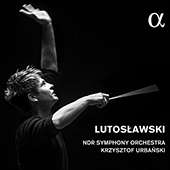|
Back
05/26/2016
Witold Lutoslawski: Concerto for Orchestra – Mala Suite – Symphony N° 4
NDR Symphony Orchestra, Krzysztof Urbánski (conductor)
Recording: Laeiszhalle (December 2014) & Rolf-Liebermann-Studio NDR (June 2015), Hamburg – 56’ 15
Alpha 232 – Booklet in German, English, French

   
Krzysztof Urbánski, Music Director of the Indianapolis Symphony Orchestra, here returns to his Polish roots and gives his conducting teacher, Antoni Wit, a run for his money. These are extremely thoughtful Luloslawski performances, well thought out and deliberately conceived.
Those wanting an earth-shattering whack at the beginning of the Concerto for Orchestra may be a bit disappointed, but there is a purposeful underplaying of drama at the opening of the work, leaving plenty of room for the interpretation to grow. The NDR orchestra shows that it is one of Germany’s—if not Europe’s—finest, in playing of virtuosity and finesse. This is one of the most nuanced readings of the Intrada. Loud moments have plenty of power, but there is a refinement and relishing of Lutoslawski’s subtler passages that create an incredibly dynamic structure. Likewise, the climax of the final Chorale, which, in many recordings, sounds like just another climax, truly feels like the goal of the entire interpretation in this outstanding performance.
Like Sibelius’ Seventh Symphony, Lutoslawski’s Fourth is a miraculous summary of its mature composer’s symphonic thinking, and can be counted among the most powerful, indestructible symphonic essays of the 20th century. As in the Concerto for Orchestra, Urbánski’s conception is patient and clear. Some early climaxes seem a bit shy, but the final peroration is gloriously led up to and conceived.
Between these two monumental works comes the delightful, early Mala Suite. The work sheds light on Lutoslawski’s eventual incorporation of folk melodies into the Concerto for Orchestra and, while it may seem inconsequential in this program, it offers another perspective of its composer’s life work. It also allows individual soloists of the NDR orchestra, especially woodwind players, more extended moments in the spotlight.
Without a doubt, Lutoslawski will be one of the 20th century composers whose music endures, especially with advocates like Urbánski. Those new to this repertoire can’t go wrong with these performances, while those familiar with the works will find many captivating interpretive nuances that keep things fresh.
Marcus Karl Maroney
|